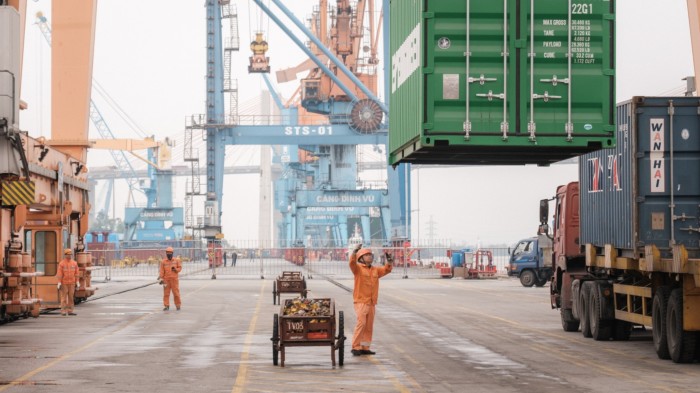Unlock the Editor’s Digest for free
Roula Khalaf, Editor of the FT, selects her favourite stories in this weekly newsletter.
Vietnam, Indonesia and other countries in south-east Asia are caught in the crossfire of US President Donald Trump’s trade war with Beijing, with the region coming under mounting pressure to clamp down on the rerouting of Chinese goods as it heads into tariff negotiations with the US.
Chinese exports to the region jumped more than 20 per cent last month, offsetting a plunge in US-China trade and underscoring accusations from the Trump administration that countries in south-east Asia were helping Chinese manufacturers avoid punitive tariffs.
Officials and trade experts said this practice, known as trans-shipment, has become a critical issue in negotiations with the US, with the Trump administration demanding countries in the region crack down to secure relief from some of the highest levies imposed on America’s trading partners.
“South-east Asia is coming under more pressure than other regions in the world . . . because of origin-washing,” said Sharon Seah, co-ordinator of the Asean studies centre at Singapore’s Iseas-Yusof Ishak Institute.
“The US thinks that the Chinese will use [the region] as a backdoor to continue exporting to the US markets.”
Countries in the region are hoping for further talks with US Trade representative Jamieson Greer at the Asia-Pacific Economic Cooperation meeting of trade envoys in South Korea this week, after Washington and Beijing announced a temporary truce in their trade war on Monday.
Many companies assemble components manufactured in China in third countries in south-east Asia, or add enough value to the products to legally change their place of origin. However, some merely relabel their products without any added value, a practice that is illegal but difficult to trace.
Vietnam has come under the most scrutiny. The country, which has the third-largest trade surplus with the US after China and Mexico, has emerged as a manufacturing powerhouse in the years since Trump’s first term as production shifted away from China.
It has been singled out repeatedly by US officials for allowing trans-shipment, and was hit with 46 per cent tariffs on Trump’s “liberation day” salvo in early April, before being given a 90-day reprieve.
Prime Minister Pham Minh Chinh told US executives in a meeting this week that Washington had stressed trans-shipment in tariff negotiations, according to Adam Sitkoff, executive director of the American Chamber of Commerce in Hanoi.
“The top priority for the US side in these trade talks seems to be the trans-shipment issue,” said Sitkoff. Vietnam was already stepping up efforts to crack down on illegal trans-shipment, he added.
Since Trump’s “reciprocal” tariff announcement, Indonesia, Thailand and Malaysia have also promised to increase scrutiny of trans-shipments.
Vietnam, Indonesia and Thailand have held initial trade talks with the US and have vowed to increase purchases of American goods and reduce non-tariff barriers.
Those concerns were highlighted last week when Chinese customs data for April showed Beijing’s exports to south-east Asia increased 21 per cent, about the same amount that those to the US had declined.
The sharpest rises were to Vietnam, Indonesia and Thailand, which analysts said reflected Chinese companies channelling US-bound goods through third countries.
While the US agreed to lower its additional tariffs on China to about 30 per cent for 90 days under the deal announced this week, its remaining levies are much higher than the 10 per cent rate currently in place on south-east Asian countries until July.
One senior south-east Asian government official who asked to remain anonymous said the US had made it clear in tariff negotiations that they would not accept “any other country piggybacking” on bilateral deals.
“Rules of origin is a big deal for the US,” said the official, who is involved in talks with Washington.
But governments in the region will be wary of taking direct action against Chinese companies for fear of angering Beijing, the official added. China is the largest trade partner and investor for most south-east Asian countries, which would seek to avoid being forced to choose between Washington and Beijing.
Vietnam and Indonesia have both prided themselves on maintaining a nonaligned foreign policy — which the former refers to as “bamboo diplomacy” — that has allowed them to balance close ties with the US and China.
But some countries were “bound to have to make choices”, said the official.
Iseas’ Seah said south-east Asian countries would seek to project neutrality rather than “take sides, but where a particular industry is worth protecting for their own national interest, they may have to”.
Deborah Elms, head of trade policy at the Hinrich Foundation, noted any push by the Trump administration to cut Chinese content out of goods originating in south-east Asia would be difficult because supply chains in the region were also closely integrated.
“If you are being asked to squeeze down or out Chinese content, and apply very stringent rules of origin, that’s going to get complicated. Governments are going to have to make a political calculation and an economic one,” she said.
“If the US is going to go down this particular path, then [it is] asking them to explicitly choose.”
Data visualisation by Haohsiang Ko in Hong Kong
Read the full article here




